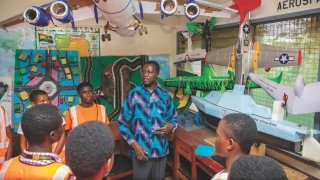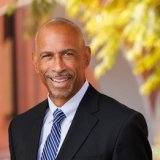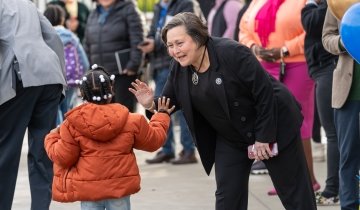Yaw Osei Adutwum PhD '09 is Ghana's minister for education and a proud Trojan. He was born in Jachie, a small village in Ghana, and later immigrated to the U.S. to attend college. His ties to USC run deep, as he began teaching mathematics in the Neighborhood Academic Initiative in 1997-2001 after several years teaching at Manual Arts High School. Adutwum later went on to earn his PhD from USC Rossier in 2009. Along the way, he founded New Designs Charter Schools in South Los Angeles, which has sinceexpanded to three campuses. When he crossed paths with now-Ghanaian President Nana Akufo-Addo at an event in L.A., his life changed course, and he found himself back in Ghana. He was appointed deputy minister for education in 2017 and became full minister in 2021. He helped lead the country’s effort to expand free secondary education for all, something many Ghanaians thought was impossible. In this interview, Dean Pedro Noguera discusses Adutwum’s USC connections, his historic effort to expand educational access in Ghana and his hopes for the future.
PEDRO NOGUERA: Tell me about your professional journey and your connection to USC.
YAW OSEI ADUTWUM: I taught at Manual Arts High School, and USC’s Neighborhood Academic Initiative which draws students from Manual Arts and Foshay Learning Center. Through the NAI, students were given Saturday school and SAT prep in addition to their regular math and English Classes at USC. At that time, if they got an SAT score of 1400, USC gave them a full scholarship. I was selected to be the lead teacher for mathematics in the [NAI] program. The classes were held in USC classrooms with the idea that as the inner-city kids sat in the lecture halls of USC, their mindset [would] change and it [would] make them feel that they have what it takes to become [USC] students. And it worked.
As a result of being on campus, I decided to do my PhD [at USC], and somewhere down the line, I decided to start a charter school. When I saw the students succeeding at the NAI, I said to myself, “They have best practices here.” It encouraged me to know that inner-city kids, given the opportunity, can perform just as well as anybody.
I was able to open my first school in 2004. My school started from grade six, and once students were in high school, they had to select a career focus. Some did law and diplomacy; others did finance and engineering. We partnered with L.A. City College, and they offered engineering classes on our campus. A number of my students pursued engineering at university because they were exposed to it.
Unlike other schools in LAUSD, students who came to my school were required to complete precalculus and three years of a foreign language before they graduated. I saw that the vast majority of South L.A. students were not qualified to go to their own public universities—so don’t even think about USC. I recognized that graduation requirements should be aligned with the entry requirements of the UCs and USC.
PN: How did you jump from L.A.—running a charter network successfully—to becoming minister of education in Ghana?
YOA: While I was in L.A., I got a call from some Ghanaians, and they said, “There’s this guy running for president in Ghana. He’s visiting L.A., and we want to welcome him in your school.” They introduced me to Nana Akufo-Addo and told him I ran the school where they were holding the event. He was shocked and amazed, and he asked, “How could a Ghanaian come to America and build schools for Americans?” I explained how the charter schools work, and he asked, “Would you consider coming back to Ghana to help me change the education system?” I asked him a question: “What is so unique about your education agenda in Ghana that will necessitate my coming back to Ghana?” He said he wanted to implement free secondary education in Ghana, and America is the nation that began free secondary education for all.
I went to meet the late Congressman Mervyn Dymally, a mentor of mine, and I brought up the subject. He said, “I’ll tell you one thing. Your schools are doing well. We are so proud of you, but America can do without you. Maybe your country cannot. So, go and help your country.”
He really spoke to my heart. It took me back to Ghana, where I grew up in a rural community on a cocoa farm. My dad and mom never went to school. When it was time for me to go to senior high school, my dad didn’t have money. My younger brother, who was taking care of my uncle’s piggery, was willing to sell a pig so that I could go. When Akufo-Addo said, “We are going to make it free,” it really touched me.
When I came, I was [appointed] a deputy minister. When we started the free senior high school policy, enrollment almost doubled, but there was not enough space for everyone. They didn’t know what to do. I went to my minister and the president and said, “We can borrow from California.” In 1994, L.A. Unified moved from three-year to four-year high schools like other districts. They needed more teachers, so I got the opportunity to be hired as one of the teachers recruited for the four-year policy. They had limited facilities, so they introduced year-round schools and were able to accommodate more people in high school.
So, we introduced year-round school in Ghana. People started complaining—Why are you changing the schedule? Why are some students at home while others are not? The president deployed me to explain year-round education— which in Ghana we call the double-track system—to every Ghanaian I could find.
PN: How is that going for you? Because, honestly, I have heard from some Ghanaian parents who are not happy with their kids being at home for long periods.
YOA: Instead of 180 school days, we have 164, but we compensate for that with a longer school day. In terms of contact hours, students don’t miss anything. If you look at learning outcomes as measured by the West African Examinations Council, the growth is unbelievable. Before the free senior high school, only 28% would pass the exams on integrated science. Now it’s 62%. If double-track is bad, why are they doing better? There were a number of things—free uniforms, tutoring—that were done in addition to increasing contact hours. Now, about 60% of our high schools have transitioned back to single-track.
As we built new schools, just like we did in California, we were able to retire year-round schools. For the well-to-do parent who could have paid for their children to go to senior high school, they will question why. But for those who wouldn’t have been able to go if it weren’t for the free senior high school policy, this is a miracle happening, something they never dreamt of.
PN: You’ve expanded access, you’ve made it free and you’ve also seen a rise, particularly in science. What are some of the things you’re trying to accomplish in Ghana?
YOA: Now we’ve gone beyond free senior high school to STEM education. We’ve built new STEM schools. We are building junior high schools that have biology, physics and chemistry labs. We’re infusing STEM into the education system, but we’re also doing STEAM so students can do music or art for one year.
The Ghanaian education system is so exam-driven, but we are changing that so we can bring innovation to the classroom We’re also creating aerospace and aviation programs. Students are developing and flying drones. Ghana is one of the first countries, probably, in Africa where we are widely distributing medicine across the country with drones. The company distributing the medicine with drones is partnering with the Ministry of Education to offer internship opportunities for our high school students.
We started with free secondary, and now we’re moving from access to quality, changing the curriculum so that we can stop rote memorization and move on to critical thinking and project-based learning. This is something the government is investing in because we believe that the better days of our nation should be ahead of us. It’s all about creating an education system that can change the socioeconomic fortunes of Ghana.
PN: Ghana sends so many highly educated people abroad to the U.S., the U.K. and elsewhere. There are now, believe it or not, more Ghanaian doctors in Washington, D.C., than in Ghana. Is there anything [that can be done] to reverse that, so that some of the talented Ghanaians will stay in Ghana to help the country?
YOA: I think, as you develop high-paying jobs in software development, engineering and other areas, and you’re creating a learning environment that will lead to those careers, that creates an opportunity for people to stay in Ghana. They will say, “I can make good money. Why travel anywhere else?”
PN: You epitomize the reversal of the brain drain because you went back. You’re proof we can bring Ghanaians back to help the country, and I’m so glad to know you’re a USC Rossier graduate doing this important work in your nation. You make us proud.





